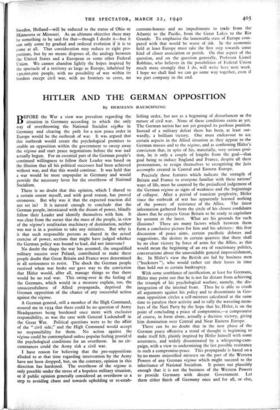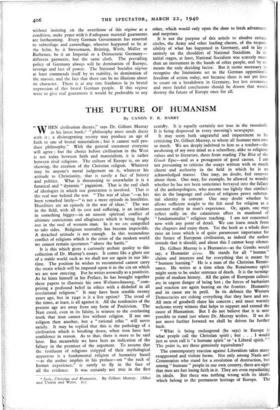HITLER AND THE GERMAN OPPOSITION
By HERMANN RAUSCHNING
BEFORE the War a view was prevalent regarding the situation in Germany according to which the only way of overthrowing the National Socialist regifne in Germany and clearing the path for a new peace order in Europe would be the outbreak of war. It was argued that this outbreak would create the psychological premises to enable an opposition within the government to sweep away the regime and start peace negotiations before the war had actually begun. For an essential part of the German people's continued willingness to follow their Leader was based on the illusion that all his political successes had been achieved without war, and that this would continue. It was held that a war would be most unpopular in Germany and would provide the necessary lever for the overthrow of National Socialism.
There is no doubt that this opinion, which I shared to a certain extent myself, and with good reason, has proved erroneous. But why was it that the expected reaction did not set in? It is natural enough to conclude that the German people, intoxicated with the dream of power, blindly follow their Leader and identify themselves with him. It was clear from the outset that the mass of the people, in view of the regime's totalitarian machinery of domination, neither was nor is in a position to take any initiative. But why is it that such responsible persons as shared in the actual exercise of power, sections that might have judged whither the German policy was bound to lead, did not intervene?
No doubt the shape the war has assumed, the unqualified military success over Poland, contributed to make these people doubt that Great Britain and France were determined in all seriousness to resist. The shock the German people received when war broke out gave way to the conviction that Hitler would, after all, manage things so that there would be no real war. This swing-over in the feeling of the Germans, which would in a measure explain, too, the unsuccessfulness of Allied propaganda, deprived the German opposition of the chance of any successful action against the regime.
A German general, still a member of the High Command, assured me in 1934 that there could be no question of Army Headquarters being burdened once more with exclusive responsibility, as was the case with General Ludendorff in the Great War. Political questions were to be the affair of the " civil side," and the High Command would accept no responsibility for them. No action against the regime could be contemplated unless popular feeling provichd the psychological conditions for an overthrow. In no cir- cumstances could the Army risk a civil war.
I have reason for believing that the pre-suppositions alluded to at that time regarding intervention by the Army have not been dropped, but, on the contrary, opinion in this direction has hardened. The overthrow of the regime is only possible under the stress of a hopeless military situation, or if public opinion generally considered an overthrow as a step to avoiding chaos and towards upholding or re-estab- lishing order, but not as a beginning of disturbances m the nature of civil war. None of these conditions exists as yet. The German nation has not yet grasped its perilous position. Instead of a military defeat there has been, at least out- wardly, a brilliant victory. One must endeavour to see certain aspects in the Allied situation as they appear to the German masses and to the regime, and as confirming Hitler's conviction that, in spite of his, materially, very serious posi- tion, he is only a couple of lengths from the goal—that goal being to induce England and France, despite all their protestations, to resign themselves to recognising the faits accomplis created in Central and Eastern Europe.
Precisely those features which indicate the strength of Britain and France to everyone familiar with these nations' ways of life, must be counted by the prejudiced judgement of the German regime as signs of weakness and the beginnings of collapse. After a period of transient perplexity, Hitler since the outbreak of war has apparently learned nothing of the powers of resistance of the Allies. The latest information gathered from the circle of his closest confidants shows that he expects Great Britain to be ready to capitulate by autumn at the latest. What are his grounds for such illusions? There are many factors which between them form a conclusive picture for him and his advisers : this free discussion of peace aims, certain pacifistic debates and suggestions, the desires in certain quarters that there shall be no clear victory by force of arms for the Allies, as this would mean the beginning of an era of reactionary politics, conversations about the unavoidable general impoverishment, &c. In Hitler's view the British are led by business men ("hucksters "), who would rather cut their losses in time than hold out to certain bankruptcy.
With some semblance of justification, at least for Germans, Hitler may point out that he is not far distant from achieving the triumph of his psychological warfare, namely, the dis- integration of the internal front. Thus he is able to crush all arguments against his policy and to disseminate in Ger- man opposition circles a self-mistrust calculated at the same time to paralyse their activity and to rally the wavering mem- bers of the Nazi Party by the hope that he, Hitler, is on the point of concluding a peace of compromise,—a compromise of course, in form alone, actually a decisive victory, giving him domination over Central and Near Eastern Europe.
There can be no doubt that in the new phase of the German peace offensive a trend of thought is beginning to make itself felt, plainly inspired by Hitler himself with some astuteness, and widely disseminated by a whispering-cam- paign, with a view to undermining the last possible resistance to such a compromise-peace. This propaganda is based on a by no means unjustified mistrust on the part of the Western Powers of any German regime which might succeed to the inheritance of National Socialism. It points out plausibly enough that it is not the business of the Western Powers to provide Germany with decent Government. Let them either finish off Germany once and for all, or else, without insisting on the overthrow of this regime as a condition, make peace with it if adequate material guarantees are forthcoming. Every German Government has resorted to subterfuge and camouflage, whoever happened to be at the helm, be it Stresemann, Bruning, Wirth, Muller or Rathenau, be it an Imperial or a Democratic Germany— different garments, but the same cloth. The prevailing policy of Germany always will be domination of Europe, revenge and lust of power. The National Socialist regime at least commends itself by its stability, its domination of the masses, and the fact that there can be no illusions about its character. There is at any rate frankness in its brutal expression of this brutal German people. If this regime were to give real guarantees it would be preferable to any other, which would only open the door to fresh adventures and surprises.
It is not the purpose of this article to absolve certain circles, the Army and other leading classes, of the respon- sibility of what has happened in Germany, and to lay it entirely on the shoulders of National Socialism. In it initial stages, at least, National Socialism was scarcely more than an instrument in the hands of other people, and by no means the only deciding factor. But it seems necessary to recognise the limitations set to the German opposition's freedom of action today, not because there is not yet time to count on a breakdown in Germany, but lest erroneous and most fateful conclusions should be drawn that would destroy the future of Europe once for all.







































 Previous page
Previous page